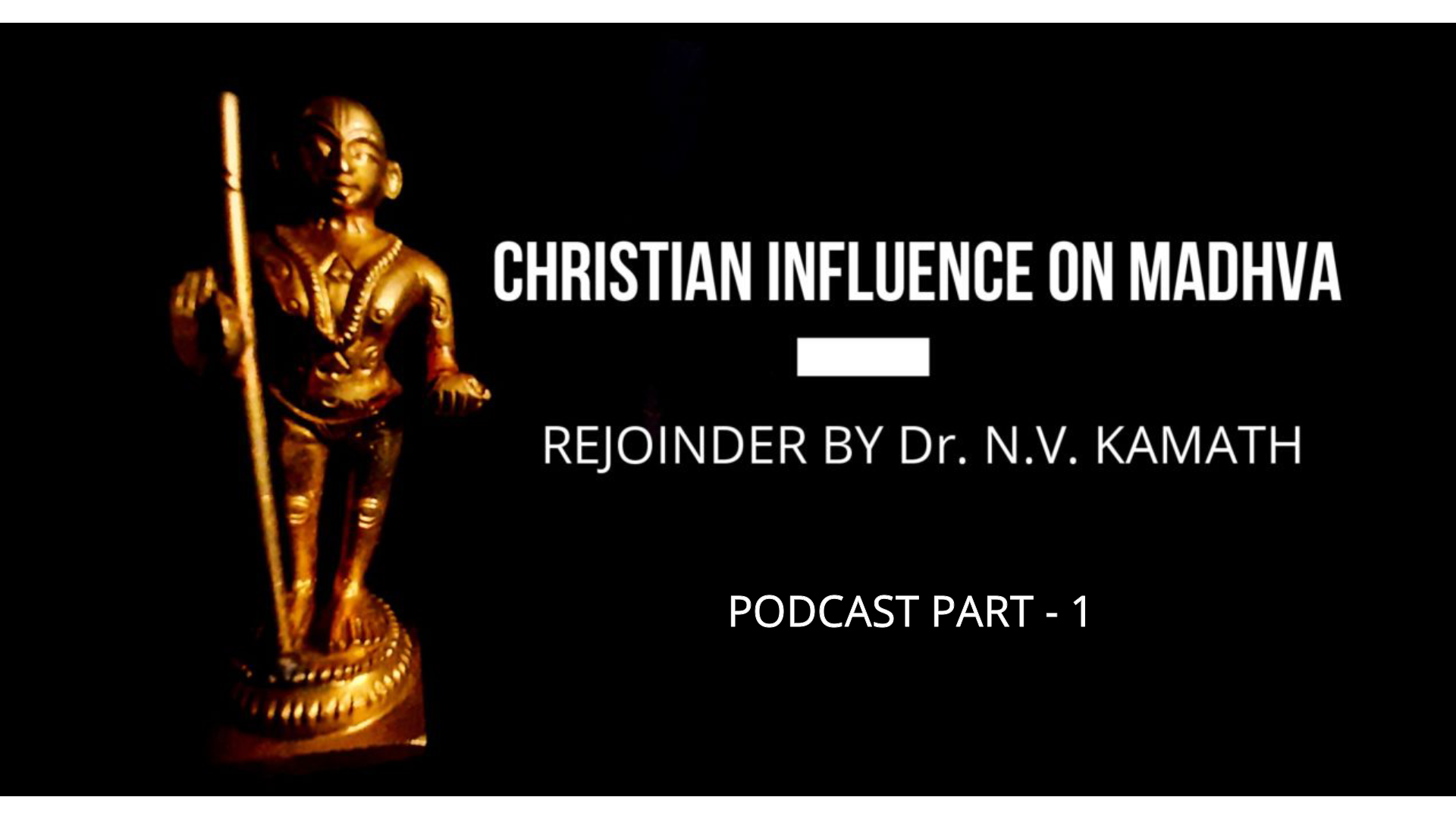NOTE FROM THE EDITOR
From more than a century, even among the schools of Vedanta, there is a notion held with some conviction that the philosophy of Sri Madhvacharya carries influence of Christianity.
Well informed people such as professors, historians and researchers albeit quietly carry this feeling.
This misconception has been rebutted by Madhva scholars from time to time.
One such riposte is Dr. N.V. Kamath’s “Christian Influence on Madhvacharya – A Myth Exploded“ published in 1998.
This write-up is an abridged version of the above book and compilation of most important excerpts from it.
INTRODUCTION:
Madhvacharya is one of the three great Acharyas of Vedanta system of Indian philosophy. Over the centuries his life and teachings have been inspiring not only his followers but even those who are not born-Madhvas.
But there are some scholars like A. C. Burnell who think that Madhva has been influenced by Christianity. In support of their claim they quote some resembling events in the life of Jesus and Madhva and some apparent similarities in doctrines and beliefs too.
Though there is no harm in accepting any opinion of any scholar based on factual assessment and cogent evidences, it would be unjust to propagate a baseless theory formed out of some apparent coincidences. This tantamount to shrouding the truth with false notions to serve one’s own convenience, leading mankind to a blind alley.
WHAT DO THESE SCHOLARS SAY?
Before taking a stand as to whether such opinions are true or otherwise, it is necessary to go through the views of different scholars, (both for and against) on the theory that the Madhva philosophy was influenced by Christianity.
- A. L. Bhasham (in his The Wonder That was India, London, 1954, p.333) is of the view that the possibility of the influence of Syrian Christians of Malabar on Madhva thought cannot be ruled out, taking into the account the striking similarities between Madhva’s system and Christianity.
- According to I. Puthiadam (in Vishnu The Ever Free, Dialogue Series, Karumathur Madurai, 1985, p. 6-7), A. C. Burnell was the first to raise this controversial issue. I. Puthiadam shows how far-fetched and imaginary is the idea of influence of either Christianity or Islam on Madhva’s doctrine.
- S. N. Dasgupta (in his A History of Indian Philosophy, Vol. IV, 1991 p. 92-93) has examined some of these opinions.
- C. M. Padmanabhachariar opines “That on many a point of doctrine there is a similarity between our system and Christianity is not denied […] At the same time it must also be remembered that numerous are the points of disagreement too. Madhvaism is purely Hindu in that it believes in transmigration and Karma, whereas the Christians will not listen to it for a moment.”
But a point by point study of this topic of supposed Christian influence on Madhva’s biography and on Madhva’s doctrines has not been undertaken so far by any scholar. Even though I do not claim to be a scholar, as a student of Madhva and his philosophy I think that the topic deserves a detailed study to show that the topic falls in the sphere of a myth or hallucinations.
UBSCRIBE TO ANVESHI CHANNEL – ACCESS FACTUAL HISTORY
SUPPOSED SUPPORTING FACTORS:
On going through the opinions of different scholars, we may sum up the above statements to enumerate the various factors which forced them to imagine that Madhva was influenced by Christianity. They are
- Madhva’s birthplace is near Kalyanapura which is believed to be the earliest settlement of Christians, on the west coast of India.
- The Gospel and Sumadhwa Vijaya narrate many similar events, connected respectively with the life of Jesus Christ and that of Madhva.
- The devitionalism of Christians resembles the Bhakti doctrine of Madhva.
Let us take them up one by one for critical consideration.
A) MADHVA’S BIRTH PLACE
Dasgupta quotes Grierson and Burnell: “Grierson…says that Madhva’s birthplace was either in the ancient city of Kalyanapura or close to it. Kalyanapura has always been reputed one of the earliest Christian settlements in India[…] Burnell, however supports the idea…but Grabs considers it probable that the Kalyanapura might have been another Kalyana, in the north of Bombay.”
Now it is clear that there are no two opinions to the birthplace of Madhva. And it is no other than Pajaka as stated clearly in the Sumadhva Vijaya. The place is still known as Pajaka only.
From all the facts and verses quoted from Sumadhva Vijaya, Pajaka is undoubtedly the birthplace of Madhva. And hence it is strange that scholars like Grierson declare that “Madhva’s birthplace was either in the ancient city of Kalyanapura or close to it.” It is very clear that these scholars did not devote any time and energy to go through the Sumadhva Vijaya, the authentic biography of Madhva.
Their argument does not hold water for the following reasons:
- according to Grierson, the Kalyanapura where Christians were said to have settled is the one near to Udupi. But Grabe considers it to be Kalyana in the north of Bombay. It has come to my notice that modern Cochin in Kerala was also once called Kalyana.
- The first historical evidence of church in South India is available in a book called “Christian Topography.” A merchant from Alexandria named ‘Cosmas Indicopleustes’ during 6th century AD refers to Quilon and Kallian (near Bombay) where Bishops used to receive taxes from Persia. This settles the doubt about the location of Kalyanapura. It should be Kalyana near Bombay.
- I had an occasion to meet Father Xavier Pinto at Milagres Church at Kalyanapura near Udupi. He states that the Milagres Church is the oldest in Kalyanapura and is existing at the most since 400 years. That is, the oldest church in Kalyanapura is established 300 years after the advent of Madhva.
- Madhva’s family, being cent percent orthodox had little chance of interaction with Christians who might have been hardly a few in number, even if it is presumed for argument’s sake that Christians had reached the western coast prior to Madhva.
- Narayana Pandita who was very meticulous in writing the biography of Madhva has not mentioned any event of Madhva’s interaction with any Christian.
- The orthodox society and the background of Madhva’s up-bringing do not support the argument that he had any access to Christian literature.
We may here conclude that India had contacts with other countries through its west coast and many travellers did visit our country. But it cannot mean that Christianity was well established in the South Kanara district at the time of Madhva of the strength of influencing his life and doctrines.
Hence there is no chance of Madhva being influenced by a not-so-established foreign religion with a few followers.
B) SIMILAR POINTS IN THE SUMADHVA VIJAYA AND THE GOSPELS:
Now let us consider the similar points both in the legends as quoted by Grierson from Gospels and the Sumadhva Vijaya.
- PRIOR PROCLAMATION OF MADHVA’S BIRTH
In the 2nd canto of Sumadhva Vijaya there are three verses describing the prior proclamation of Madhva’s birth.
The English version of D. R. V. Rau is:
“Lord Anantasana residing in Udupi entered a (dull) person for the happiness of the virtuous people and for indicating the auspicious incarnation (of Lord Vayu) in Udupi where a big crowd of curious people had come with excitement for the holy festival of Makara Sankranti.“
“That Lord Anantasana who had entered (the body of) a person dull by nature and who is of the nature of astonishing all danced like an actor in the interior of a stage moving His limbs at the top of a flag pole by convincing His devotees in Udupi.“
“That Lord Anantasana (who had entered the body of a person) calling the multitude of the people in Udupi to hear (Him) said this word by uplifting His shoulders and loudly with an oath : “Here in this world there will be born a person who is omniscient, possessed of the six attributes (such as prosperity, prowess, fame, wealth, knowledge and dispassion) and of conduct beneficial to all people.“
A similar incident of the prophecy of the birth of Jesus from the Gospel is mentioned below. According to Mathew (The Holy Bible- Revised Standard Version – Catholic Edition for India, published by Collins for Theological Publication in India, Bangalore in 1973. The New Testament, p.1):
“Now the birth of Jesus Christ took place in this way. When his mother Mary had been betrothed to Joseph, before they come together she was found to be with child of the Holy Spirit; and her husband Joseph, being a just man and unwilling to put her to shame, resolved to divorce her quietly. But as he considered this, behold, an angel of the Lord appeared to him in a dream saying “Joseph, son of David, do not fear to take Mary your wife, for that which is conceived in her is the Holy Spirit; she will bear a son, and you shall call his name Jesus, for he will save his people from their sins. All this took place to fulfill what the Lord had spoke by the Prophet:
“Behold a virgin shall conceive and bear a son and his name shall be called Emman-u-el” (which means, God with us).
When Joseph woke up from sleep, he did as the angel of the Lord commanded him; he took his wife, but knew her not until she had borne a son; and he called his name Jesus.”
In the two incidents mentioned above, there is no other resemblance than the prophesy of the birth of the child. On the contrary, some points of contrast can be noted:
- Grierson’s view that ‘the spirit of deity Anantesvara appeared to a Brahman” is not true to fact. It is not mentioned by Narayana Pandita. It was a dullard who was taken possession by the Lord. It is very clear from the word “akuSalaM purusham” (from Sumadhva Vijaya).
- The backgrounds of prophecies are different; so also the circumstances. It was the angel of the Lord who prophesied the birth of Jesus, while in the case of the birth of Madhva, the Lord Himself took possession of a person to declare Madhva’s birth.
- It was in the dream of Joseph that the angel foretold the birth of Jesus and Joseph only knew it; while the prophesy mentioned in the Sumadhva Vijaya was declared in the real life to a huge gathering at the time of celebrating a festival.
- The angel of the Holy Spirit made it clear Mary would bear a son and he should be called ‘Jesus’. But in the Sumadhva Vijaya, the prophesy did not mention anything about Madhva’s parents nor about his name after the birth.
- Mary had been betrothed to Joseph and before they come together, she was found to be with child of the Holy Spirit. But Madhyageha Bhatta and his wife had been craving for a male issue for years.
Thus it is evident that the two incidents are not at all comparable in anyway. The factual dissimilarities outnumber the apparent similarities.
Again, it is necessary to go through the Gospel according to Saint Luke also wherein it is mentioned that the angel came to Mary to foretell the birth of Jesus. But in the Sumadhva Vijaya the public at large was informed about the birth of a great person. It was neither revealed who would be the parents of that great person not what his name would be.
Madhva’s parents had not come across with any angel or any super human being, either in reality or in dream, to declare to them that a great son would be born to them.
Hence, without any doubt, we have to dismiss the statements of Grierson that the incident of proclamation of Madhva’s birth has any similarities to come to the conclusion about the influence of Christianity on the prior proclamation of Madhva’s birth.
SUBSCRIBE TO ANVESHI CHANNEL – ACCESS FACTUAL HISTORY
C) MADHVA’S DOCTRINE OF BHAKTI & DEVOTIONALISM OF CHRISTIANITY:
There is no doubt that Christianity is theological school and Madhva too is a theologist. As such both speak of Bhakti or devotionalism.
But we must consider whether Madhva borrowed his doctrine of Bhakti from the devotionalism of Christianity.
Let’s first try to understand Madhva’s doctrine of Bhakti.
Salient features of Madhva’s Bhakti doctrine can be given as below:
- Madhva defines Bhakti: “That firm and unshakable love of God, which rises above all other ties of love and affection based upon an adequate knowledge and conviction of His great majesty, is called Bhakti. That alone is the means of Moksha.”
Jayatirtha has given us the most comprehensive definition of Bhakti in which the religious, philosophical and emotional aspects of devotion are beautifully integrated:
परमॆश्वरभक्तिर्नाम निरवधिकानन्तानवद्यकल्याणगुणत्वज्ञानपूर्वकः स्वात्मात्मीयसमस्तवस्तुभ्यॊsप्यनन्तगुणाधिकॊनन्तरायसहस्रॆण्याप्यप्रतिबद्धः निरंतरप्रॆमप्रवाहः (Nyaya Sudha p.17)
“Bhakti is thus, the steady and continuous flow of deep attachment to God, impregnable by any amount of impediments and transcending the love of our own selves, out kith and kin, cherished belongings, etc. and fortified by a firm conviction of the transcendental majesty and greatness of God as abode of all perfections and free from all blemish and by any unshakable conviction of the complete metaphysical dependence of everything else upon Him. This definition can be accepted as a classical definition of Bhakti.”
2. Secondly, Bhakti is the motivating force in the spiritual advancement of an aspirant towards his goal of attaining the bliss of final liberation. Madhva states: “From Bhakti one reaches (mediate) knowledge, thence again ripe Bhakti, thence vision and then again very ripe devotion to the Lord. Then comes Mukti (release) and thereby Bhakti again which is of the essence of bliss.” So Bhakti is essential even in the liberated state.
3. Thirdly, Madhva’s Bhakti is not merely a means but it is an end itself. Dr. B.N.K. Sharma remarks – “a very striking and almost unique feature of Madhva’s philosophy of Bhakti that it is viewed, not as a means to an end, but as an end in itself. The light of Bhakti shines brightly not only on this side of release, but on the other side of it as well. For, the relation between the individual and the Supreme Being is not something that is destroyed by release. For this relation itself is not something that is extrinsic to the nature of the soul; but something that is rooted in its very nature and being (svarUpa). And Mukti is shaking off what is extrinsic to one’s nature and reposing in one’s own intrinsic nature.”
4. Fourthly, Madhva has laid down that an aspirant should perform even his worldly duties with Bhakti: “Dharma or supreme duty or right conduct is pleasing God by performing one’s ordained duties with Bhakti or devotion to God.” This means that Bhakti should pervade the entire life of an aspirant.
Now we must examine whether these outstanding features of Madhva’s doctrine of Bhakti are found in the devotionalism of Christianity. The following account will show that the devotionalism of Christianity leans towards fear for an awe-inspiring God rather than towards love to Him, which is the firm basis of Madhva’s doctrine of Bhakti.
-
HOW TO SHOW DEVOTION TO GOD? (THE HOLY BIBLE – THE GIDENOUS INTERNATIONAL 1980)
(i) “Honour the Lord with thy substance, and with the first fruits of all thine increase.”
(ii) “Trust in the Lord with all thine heart; and lean not unto thine own understanding.”
It is to say that “devotion” is through honour and trust in God. The knowledge of the God to be omnipotent generates in our hearts the said honour and trust.
2. SERVE HIM THROUGH BODY AND MIND
“I BESEECH you therefore, brethren, by the mercies of God, that you present your bodies a living sacrifice, holy, acceptable unto God, which is your reasonable service.”
“Only fear the Lord, and serve him in truth with all your heart; for consider how great things he hath done for you. But if ye shall still do wickedly, ye shall be consumed, both ye and your king.”
This means one has to sacrifice everything including one’s body in His service. It should be a truthful service. Fear Him, for, wickedness will not do any good to anyone.
3. HE REFORMS THOSE WHOM HE LOVES
“My son, despise not the chastening of the Lord; neither be weary of his correction. For whom the Lord loveth he correcteth : even as a father the son in whom he delighteth.”
Further it is stated:
“The Lord by wisdom hath founded the earth; by understanding hath he established the heavens. By his knowledge the depths are broken up, and the clouds drop down the dew.”
This means, without His knowledge nothing moves. He is instrumental for all things to happen.
“The curse of the Lord is in the house of the wicked: but he blesseth the habitation of the just. Surely he scorneth the scorners : but he giveth the grace unto lowly.”
“Be not wise in thine own eyes: fear the lord, and depart from evil.”
In other words be just; do good; shell down ego; fear him and get His grace.
The Bible advises the aspirant not to think more highly than necessary. It advises to be sober. It reminds that human beings are brought here with a price. It states that the body and the mind belong to Him. Hence we have to glorify Him:
“For I say, through the grace given unto me, to every man that is among you, not to think of himself more highly than he ought to think; but to think soberly, according as God hath dealt to every man the measure of faith.”
“What? know ye not that your body is the temple of the Holy Ghost which is in you, which ye have of God, and ye or not your own? For ye are brought with a price; therefore glorify God in your body, and in your spirit, which are God’s.”
We are asked to be thankful to God for calling us into His kingdom and glory:
“That ye would walk worthy of God, who hath called you unto his kingdom and glory. For this cause also thank we God without ceasing, because, when ye received the world of God ye heard of us, ye received it not as the word of men, but as it is in truth, the word of God, which effectually worketh also in you that believe.”
Now anybody can note that the salient features of Madhva’s Bhakti are conspicuously absent in the devotionalism of Christianity.
In this connection it is worthwhile to note that the doctrine of Bhakti is as old as if not older than the Rugveda. The reputed Vedic scholar H. D. Velankar has collected all the Vedic rudiments of Bhakti in his work ऋग्वॆदांतील् भक्तिमार्ग (Marathi) and has shown that even some of the modes of nine-fold Bhakti enumerated in the Bhagavata were known to Vedic Aryans.
Coming to Upanishads, the well known passage of the Shvetasvatara can be noted to understand that the Upanishadic seers had the full idea of Bhakti and its potency.
Coming to the Bhagavadgita, its Bhaktiyoga is widely known throughout the world needing any elaboration.
All this means that there is no necessity for any Indian thinker to go outside our ancient scriptures to secure full knowledge of Bhakti leading to final liberation.
Hence it is a myth if anybody remarks that Madhva’s doctrine of Bhakti was influenced by devotionalism of Christianity.
*****








